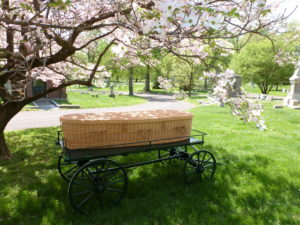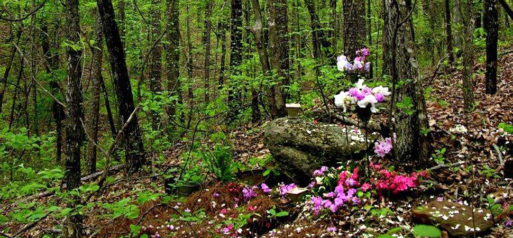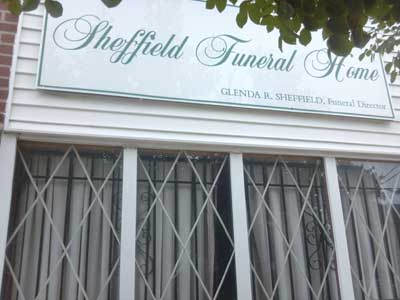Today SevenPonds speaks with Glenda Sheffield. She is the founder, owner and Senior Director of Sheffield Funeral Home in Philadelphia, Pennsylvania. She has been in the funeral home business in one capacity or another for more than 30 years. Included are her insights into the business, particularly how the industry has changed since she has been involved and new directions the industry is headed in.
Lucas: How did you come to own your own funeral home?
Glenda Sheffield: Before I owned a funeral home, I worked in the industry for over 20 years. I initially thought about becoming involved when I was in junior high. Back when I started, I wanted a job where I would be relatively safe from getting laid off. Eventually, I got knowledgeable enough that I wanted to become a supervisor. And then, when I felt confident in my skills, I began searching for funeral homes that I could purchase. When I eventually found the space where my company is now, I learned that my former boss was good friends with the owner at the time, and I got into contact with her about purchasing it. I’ve owned it since 2002.
Lucas: I know many funeral homes in this country are family-run operations as opposed to corporate entities. I’ve always had this vision of a funeral home being “the family business.” Is your funeral home family-operated?
Glenda: The short answer is no. I really started it by myself. Very rarely do I have family members help out. I currently have three part-time employees. That being said, most funeral homes are indeed family-run. They are generally passed down from generation to generation. A person’s grandfather may have started it, and just stays in the family.
Lucas: My guess is that people generally prefer these smaller, family-style funeral homes. Have corporations tried to buy you out?
Glenda: People definitely prefer the smaller, family-run businesses. Corporations are colder, and their prices are higher. They are more about the money than about helping the family. And they really have no compassion. Family businesses are much more connected to the community and all.
To answer your question, no, corporations have not tried to buy me out. My business is too small to gauge the interest of the bigger companies. They usually go after the larger funeral homes, ones that do hundreds of funerals a year. I do about 55-60 funerals and cremations a year.
Lucas: What’s the biggest way the industry has changed since you started?
Glenda: I would say the biggest difference is that more and more people are changing over to cremations. Traditional burials involving body preparation, funeral service, casket, etc. can be very expensive, and a lot of people just don’t have the money anymore.
Lucas: How often do people come to you to pre-plan their own funeral?
Glenda: It is very common. In fact, I just had five people come to me to pre-plan in the past week. Generally, it’s people who are terminally ill and want to make it a smoother, easier transition for their family. I really try to encourage pre-arrangements. It depends on the person though, whether they want to pre-plan or not. Some people think that if they make these arrangements they will die right away, or they really don’t even want to think about it. Lots of people don’t want to be reminded of anything unpleasant. The ones who are interested in pre-planning are more realistic about it, in that they are accepting of what is going to happen and aren’t afraid to confront their mortality.

Biodegradable casket
(Credit: environmentalecho.com)
Lucas: I know that a lot of people around the world are really pushing for green burials these days. For our readers who don’t know, what is a “green” burial?
Glenda: A green burial is one that uses environmentally-friendly materials throughout the entire process. It’s about harming the environment as little as possible, perhaps even benefiting the earth. The materials used for both the caskets and urns are biodegradable. We don’t put concrete or metals into the earth or use chemicals like formaldehyde. The website FinalFootprint.com offers many green funeral products. The site has numerous photos so you can get a good idea of what the products look like.
Lucas: Do many people know about green burials?
Glenda: From my experience, not so much. I never have people come to me regarding green burials. That’s one thing that I really want to do for the community: I always try to let people know about green burials and cremations. What they are, why it is an important new development in the mortuary world, and so forth. It’s not that people aren’t interested, it’s just that they don’t even know it is a thing. I will try to mention it when I talk at churches and other community gatherings, and when families come to put together a burial or crematory service.
Lucas: How popular are green burials? Are they starting to gain momentum throughout the country?
Glenda: Not quite yet, from my understanding. I would like to say that they are, but I really haven’t gotten too many requests for them. From what I can tell, most funeral homes are not really doing them or even promoting them much. A lot of them still seem more interested in the bigger, more elaborate funerals. Sheffield Funeral Home actually has not performed any yet. As I said before, a majority of people just aren’t aware that green burials are available to them, but I would certainly recommend them for friends and family. I would love to see the funeral home industry become more involved in the green burial movement.

A wooded area is a perfect setting for a green burial
(Credit: connectingdirectors.com)
Lucas: How expensive are green caskets and urns?
Glenda: They are about the same price as traditional caskets and urns, which is another reason why I think more people would be interested in the green movement if they were aware of it. I actually have a favorite “green” urn on FinalFootprint.com. They have an African one which is very beautiful. I’d love to have it in my funeral home.
Lucas: Do you have any new plans or ideas in the works for 2017?
Glenda: Oh yes, in fact I have many new things I’m planning for the upcoming year. One of the more exciting ones I have lined up is a special 1-800 number I’m calling “After the Storm.” It will be a sort of comfort line for people who’ve lost a loved one or a pet, or simply want someone to talk to. People can call the number 24/7. I will be one of the people answering the phone as well as a few other people. It’s really an effort to help those dealing with grief. Sometimes people need an outside voice to put things in perspective. I’ve never done anything like this before, so I don’t know how it will go.
We will also host a hot pepper plant sale in either September or October. I’m looking forward to that. It’s another way we’d like to get involved with and give back to the community. And finally, I want to set up a pet crematory. I will start to look for a building to buy soon. Animal crematories are generally smaller, but I don’t know too much about them. I need to check it out with some others in the funeral home industry. Cats and dogs are small, but horses are quite large! I plan to include a meditation room there as well.

Sheffield Funeral Home hopes to add a pet crematory to its list of services this year.
Lucas: Wow! You certainly have a lot on the horizon for the new year!
Glenda: You know, the funeral home industry is definitely changing. We’re not busy like we used to be. Some families haven’t had a funeral in 15 years, so funeral homes have to think of new ways to make up for lost revenue. We are also getting a new logo, which is very cool. It’s for the funeral home in general, so when everybody sees it they’ll know it’s Sheffield Funeral Home.
Lucas: What’s the most rewarding aspect of your job?
Glenda: Definitely when a family is satisfied with the work we’ve done with their loved one and the memorial service. Seeing a family at peace with their loved one’s service and being pleased with the outcome makes it all worthwhile.
Lucas: Do you have any tips or recommendations for families who may lose or have lost a loved one?
Glenda: I would say to plan the memorial service as soon as possible, because you never know when someone with a terminal illness will die. It’s a smoother transition when you at least have an idea of what you or your loved one may want out of the service. We also really want to personalize each person’s funeral service, so knowing someone’s favorite color, flower etc. can also help a lot. It’s also important to finalize things like any insurance policies they may have had, to close bank accounts and take care of social security. Sometimes people forget about those things.
Lucas: Thank you very much for taking time to speak with us! I certainly have learned a lot about the funeral home industry. Good luck with all of your new ventures for the new year!
Glenda: Thank you! It was great speaking with you too.

 What is the Current State of the Funeral Home Industry? An Interview with Glenda Sheffield
What is the Current State of the Funeral Home Industry? An Interview with Glenda Sheffield



 John Mulaney’s “Funeral Planning” on Netflix: No Real Plan
John Mulaney’s “Funeral Planning” on Netflix: No Real Plan

 Composting Bodies Is Now Legal in a Dozen States
Composting Bodies Is Now Legal in a Dozen States














